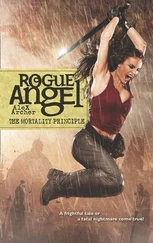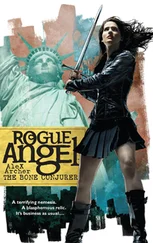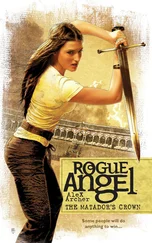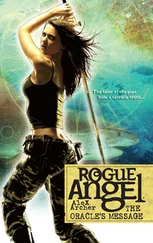Rogue Angel
The Lost Scrolls
Alex Archer
www.mirabooks.co.uk
THE LEGEND
CHAPTER 1
CHAPTER 2
CHAPTER 3
CHAPTER 4
CHAPTER 5
CHAPTER 6
CHAPTER 7
CHAPTER 8
CHAPTER 9
CHAPTER 10
CHAPTER 11
CHAPTER 12
CHAPTER 13
CHAPTER 14
CHAPTER 15
CHAPTER 16
CHAPTER 17
CHAPTER 18
CHAPTER 19
CHAPTER 20
CHAPTER 21
CHAPTER 22
CHAPTER 23
CHAPTER 24
CHAPTER 25
CHAPTER 26
…THE ENGLISH COMMANDER TOOK
JOAN’S SWORD AND RAISED IT HIGH.
The broadsword, plain and unadorned, gleamed in the firelight. He put the tip against the ground and his foot at the center of the blade.
The broadsword shattered, fragments falling into the mud. The crowd surged forward, peasant and soldier, and snatched the shards from the trampled mud. The commander tossed the hilt deep into the crowd.
Smoke almost obscured Joan, but she continued praying till the end, until finally the flames climbed her body and she sagged against the restraints.
Joan of Arc died that fateful day in France, but her legend and sword are reborn…
“I thought Julius Caesar burned down the Great Library,” Annja Creed said. She picked her way gingerly across a small lot of churned-up dust with chunks of yellow-brick rubble in it, glad for the durability of her hiking boots. She was sheltered from the already intense morning Mediterranean sun by the floppy straw hat she wore over her yellow T-shirt and khaki cargo pants.
“He did, Ms. Creed,” her handsome young Egyptian archaeologist escort said, turning to smile at her. He had a narrow, dark hawk’s face and flashing eyes. His white lab smock hung from wide shoulders and flapped around the backs of his long skinny legs in the sea breeze snaking around the close-set buildings. “Among others.”
“Call me Annja, please,” she said.
He laughed. His teeth were as perfect as his English. His trace of accent made young Dr. Ismail al-Maghrabi seem that much more exotic. I love my job, she thought.
“If you will call me Ismail,” he said.
“Done,” she replied with a laugh.
Ahead of them stood a ten-foot-high loaf-shaped translucent plastic bubble. The rumbling of generators forced them to raise their voices as they approached. Some kind of structure had recently been demolished here, hard by the Alexandrian waterfront in the old Greek quarter. Big grimy warehouses and blocks of shops with cracked-stucco fronts crowded together on all sides. Although Alexandria was a major tourist destination the rumble and stink of buses and trucks through the narrow streets suggested little of charm and less of antiquity. Still, Annja’s heart thumped in her throat with anticipation.
“For one thing,” al-Maghrabi said, “the library was very extensive indeed. Also parts of it appear to have been scattered across the Greek quarter. As you probably know, in 2004 a team of Egyptian and Polish archaeologists uncovered a series of what appear to be lecture halls a few blocks from here.”
She nodded. “I read about it on the BBC Web site at the time. A very exciting development.”
“Most. The library was a most remarkable facility, as much a great university and research center as anything else. Along with the famous book collections, and of course reading rooms and auditoria, it offered dormitories for its visitors, lush gardens, even gymnasia with swimming pools.”
“Really? I had no idea.”
He stopped to open the latch to a door in a wooden frame set into the inflated tent. “The envelope is for climate control,” he explained, opening the door for her. “Positive air pressure allows us to keep humidity and pollution at bay. Our treasures are probably not exceptionally vulnerable to such influences, considering their condition, but why take chances?”
The interior seemed gloomy after the brilliant daylight. Annja paused to let her eyes adjust as he resecured the door. There was little to see but a hole cut into the ground. “You seem to enjoy some pretty enviable resources here, if you don’t mind my saying so, Ismail.”
“Not at all! Our discoveries here have attracted worldwide attention, which in turn helps to secure the resources to develop and conserve them properly. For that I believe we have to thank the Internet—and of course your own television network, which provides a share of our funding.”
“Yes. I am thrilled they allowed me to come here,” Annja said.
“I’m told the scrolls contain revelations about the lost civilization of Atlantis.” Annja couldn’t mask the skepticism in her voice.
“Come with me. I trust you don’t mind a certain amount of sliding into holes in the ground?”
Annja laughed. “I am a real archaeologist, Ismail. I don’t just play one on TV.”
She didn’t actually have to slide. A slanting tunnel about three feet wide and five feet high had been dug down to a subterranean chamber perhaps a dozen feet below ground level. Hunched over, they followed thick yellow electrical cords down the shallow ramp.
“As you no doubt know,” her guide said, “the library is believed to have been built early in the third century B.C. by Ptolemy II, around the temple to the Muses built by his father, the first Ptolemy.”
“That’s the Mouseion, isn’t it?” she said. “Origin of our word museum? ”
“Yes. It was also said that Ptolemy III decreed that all travelers arriving in Alexandria had to surrender any books or scrolls in their possession to be copied by official scribes before being returned to them. While we don’t know for certain if that is true, the library’s collection swiftly grew to be the grandest in the Mediterranean world.”
They reached a level floor of stone polished slick by many feet over many years. Banks of yellowish floodlights lit a chamber perhaps ten by twenty feet. Three people were crowded inside, two on hands and knees rooting in what appeared to be some kind of lumpy mound. One was bending over a modern table. The air was cool and smelled of soil and mildew.
The person at the table straightened and turned toward them, beaming. He was a tall, pot-bellied young man with crew-cut blond hair and an almost invisible goatee on the uppermost of his several chins. “Greetings! You must be Annja Creed.”
He held out a big hand. Annja knew at once he was a working archaeologist. He looked soft and pale overall, but his hand was callused and cracked like a stonemason’s, from digging, lifting and the painstaking work of chipping artifacts from a stony matrix with a dentist’s steel pick.
“This is Dr. Szczepan Pilitowski,” Ismail said. He struggled with the first name—it came out sounding close enough to Stepan. “He’s our expert in extracting the scrolls safely from the ground.”
“We all do what we can,” Pilitowski said in a cheerful tone. “There is much to be done.”
The other two, a man and a woman, turned around and picked themselves up from the floor. They wore kneepads, Annja noticed. One was a man, the other a woman. Both were thin and dark, and she took them for Egyptians.
“This is Ali Mansur and Maria Frodyma,” Ismail said. The man just bobbed his head and grinned shyly.
The woman stuck out her hand. She wore her black hair in a bun, and had a bright, birdlike air to her. “Please call me Maria,” she said in a Polish accent as Annja shook her hand.
“Annja.”
“This was a library storeroom,” Ismail said. “Most of the scrolls were kept in locked cabinets, in chambers such as this. Only the most popular items, or those specifically requested by scholars, were stored in the reading rooms.”
Читать дальше












